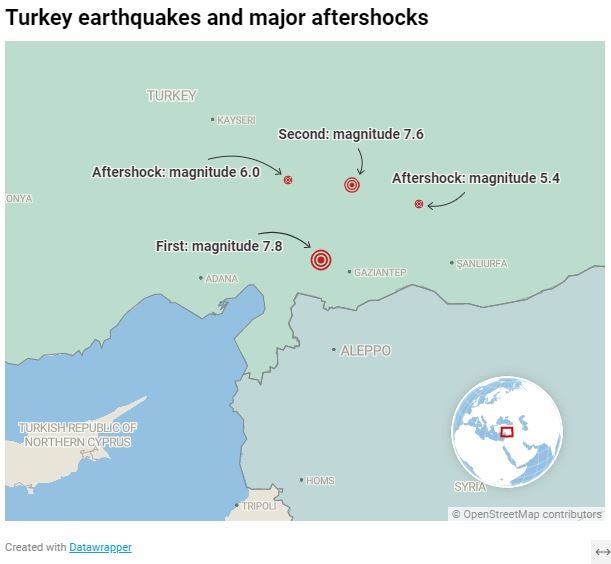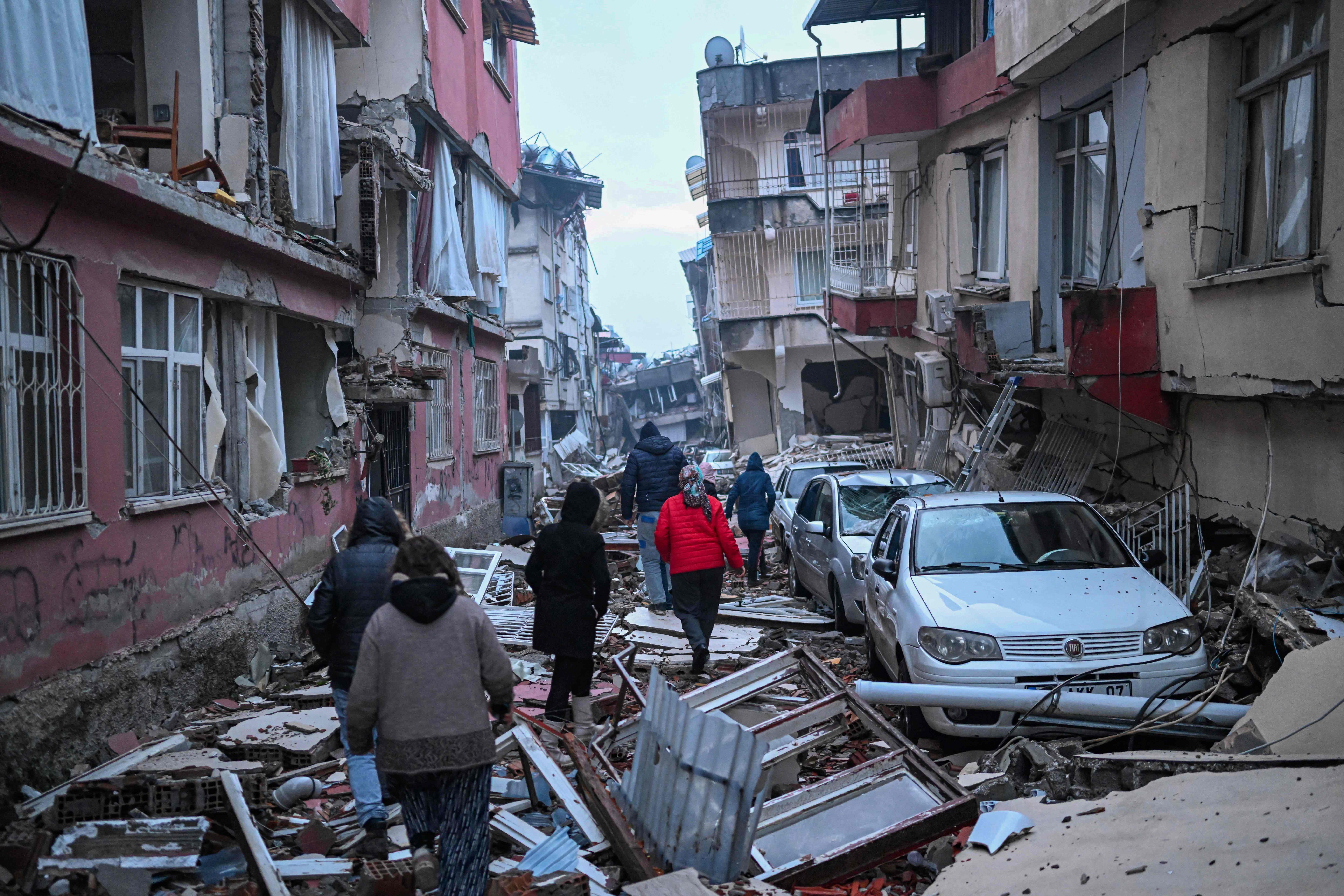20,000 feared dead in earthquake carnage as rescuers race against time to save trapped victims
Around 23m lives – including those of 1.4m children – blighted by the disaster, says the World Health Organisation
Rescue teams are in a race against time to find survivors of the devastating earthquakes that struck Turkey and Syria, with fears that the final death toll could reach 20,000.
Search teams from all over the world, as well as almost 25,000 rescue workers from Turkey, have spread out across the huge area that has been flattened by the tremors. Although rain and snow, plus plummeting temperatures at night, have hampered search efforts – meaning that a number of areas have so far been left without help.
The World Health Organisation (WHO) estimates that 23 million people across both countries could be directly affected by the earthquakes, including 1.4 million children. Unicef also believes that the number of dead could end up including thousands of children.
“It’s now a race against time,” WHO’s director general Tedros Adhanom Ghebreyesus said in Geneva. “Every minute, every hour that passes, the chances of finding survivors alive diminishes.”
Catherine Smallwood, the WHO’s senior emergency officer for Europe, has said that the number of dead rises “significantly” in the week after disasters, and that it reaching 20,000 is possible.
Residents have been forced to try to dig their relatives out of the buildings that fell around them. Those trapped have been calling out or sending messages via phone to give a sense of their location.
“We could hear their voices, they were calling for help,” said Ali Silo, whose two relatives could not be saved in the Turkish town of Nurdag. In the end, it was left to Silo, a Syrian who arrived from Hama a decade ago, and other residents to recover the bodies and those of two other victims.
In the Turkish city of Antakya, capital of Hatay province near the Syrian border, a woman’s voice was heard calling for help under a pile of rubble. Weeping in the rain, a resident who gave his name as Deniz wrung his hands in despair.
“They’re making noises but nobody is coming,” the man said. “We’re devastated, we’re devastated. My God... They’re calling out. They’re saying, ‘Save us’ but we can’t save them. How are we going to save them? There has been nobody since the morning.”
There have been a number of stories of people of all ages being pulled from the wreckage of where they used to live, including a baby born in the rubble.
Turkey said that more than 8,000 had been pulled from the rubble by Tuesday afternoon. The death toll across both Turkey and Syria quickly crossed 7,200 during the day, with the majority coming from regions in the Turkish south. That number is only expected to rise, with the World Health Organisation saying that there were a number of areas of both nations from which there had been no information yet.

Turkish authorities say some 13.5 million people were affected in an area spanning roughly 280 miles from Adana in the west to Diyarbakir in the east, and 190 miles from Malatya in the north to Hatay in the south. The country’s president Recep Tayyip Erdogan has declared the 10 Turkish provinces affected as a disaster zone and imposed a state of emergency in the region for three months. This will permit the president and cabinet to bypass parliament in enacting new laws and to limit or suspend rights and freedoms.
Syrian authorities have reported deaths as far south as Hama, some 60 miles from the epicentre, with rescue teams in opposition areas of the northwest suggesting there could be hundreds trapped under the rubble.
Other nations have also reported people missing, with the UK saying that the whereabouts of three British nationals are unknown and that a few dozen others that have been directly affected are being supported.
For those left homeless in both nations, thousands gathered at makeshift emergency shelters or mosques, who have thrown open their doors. Others slept in cars or have huddled in shopping malls, stadiums or community centres. Some spent the night outside in blankets gathering around fires.

Many have seen their homes destroyed, or are too afraid to return thanks to the threat of aftershocks, with dozens having been felt since the initial massive 7.8 magnitude earthquake and a 7.5 magnitude quake just hours later. Those aftershocks have reached nearly magnitude 6 at times.
Some 380,000 people in Turkey have taken refuge in government shelters or hotels, said Turkish vice president Fuat Oktay. The Turkish government has plans to open up more hotels in the tourism hub of Antalya, to the west, to temporarily house people impacted by the quakes. Many people are still wearing the clothes they had on when the first earthquake struck at 4am local time on Monday.
Rami Araba, who works for CARE International, a humanitarian charity, is in Gaziantep. “There is no water, and we are outside in the snow in the freezing cold,” he says from a shelter. “The aftershocks are very strong, and everyone fears that the next building will collapse, so no one dares to go back inside.”
“The number of affected people is extremely high. Nobody is asking if you are Turkish or Syrian, it doesn't matter now. There are students, people of different nationalities and we are all in shock.”
The long-term situation is particularly acute for Syria, with the country having been ravaged by years of fighting. In opposition-held areas around the country’s northwest, infrastructure such as hospitals and shelters are already overwhelmed with millions having been displaced during the war, while a number of areas have been flattened by repeated bombardment by the forces of Syria's President Bashar al-Assad. The Syrian government has been accused of playing politics with aid, with the Syrian ambassador to the UN, Bassam Sabbagh, saying his country should be responsible for the delivery of all aid into the country, including those areas not under government control. The flow of UN aid from Turkey to northwest Syria has been temporarily halted due to damage to roads and other logistical issues.
In the Syrian city of Hama, Abdallah al Dahan said funerals for several families were taking place on Tuesday.
“It’s a terrifying scene in every sense,” he told Reuters. “In my whole life, I haven’t seen anything like this, despite everything that has happened to us.”
Join our commenting forum
Join thought-provoking conversations, follow other Independent readers and see their replies
Comments


Bookmark popover
Removed from bookmarks